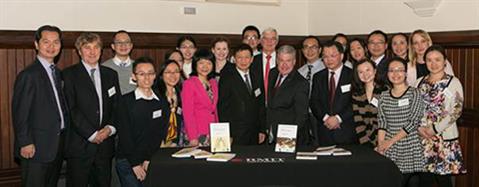
Colleagues from the WHO Collaborating Centre for Traditional Medicine at RMIT university at the launch of two reference books on evidence-based Chinese medicine in 2015
MELBOURNE - The WHO Traditional Medicine Strategy 2014–2023 requests WHO secretariat to continue to provide support and technical guidance to Member States by developing relevant documents and tools regarding policy studies, research, resource preservation and sustainable use; and to promote international collaboration on traditional medicine research.
The Discipline of Chinese Medicine, School of Health and Biomedical Sciences at RMIT University, the WHO Collaborating Centre for traditional medicine, is working with WHO on the collection and analysis of data, development of survey instruments, education and workforce to support the implementation of WHO's global and regional strategies.
This work includes research on traditional medicine and publishing of a series of reference books on evidence-based clinical Chinese medicine. The series of publications offers an up-to-date and complete analysis of disease management in Chinese medicine, with references to classical Chinese medicine literature and contemporary clinical literature, as well as clinical trial outcomes and reviews of experimental studies.
Professor Charlie C. Xue, Director of the centre, explained: "Chinese medicine practitioners can refer to these books for guidance on herbal medicine formulas, specific herbs and acupuncture points and be informed by the current best evidence for their decision-making. These publications are also of significant value for students of evidence-based Chinese medicine and for academics involved in teaching or in clinical studies of Chinese medicine." In 2015, two volumes of this series were published: Volume One: Chronic obstructive pulmonary disease (COPD) and Volume 2: Psoriasis Vulgaris. In evidence-based medicine, systematic reviews of clinical evidence normally require a comprehensive update every five years. Thus, starting from 2020, these reference books will be updated periodically. In addition to the publication of these reference books in English (by the World Scientific Publisher in Singapore) and Chinese (by the People’s Health Publishing House in China), the Centre will lead the translation of key findings into good clinical practice, guidelines and/or pathway manuals to enhance evidence-based integrative clinical practice, primarily in China. Through evidence generation and application, the WHO Collaborating Centre will provide support to the regional office in developing policies, guidelines and innovative tools for supporting the assessment and strengthening of the quality and safety of traditional medicine services. It will contribute to achieving universal health coverage through promoting safe and effective use of traditional medicine in the Region.
This story is adapted from: McGillivray, R. Landmark reference books support evidence-based Chinese medicine, RMIT University, 30 November 2015, https://www.rmit.edu.au/research/centres-collaborations/multi-partner-collaborations/cairccm/publications/evidence-based-chinese-medicine-clinical-monograph-series

/59748.tmb-300v.png?sfvrsn=9885965b_2)


